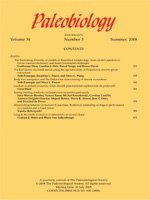Understanding the extent to which the reported fossil record reflects biological history, rather than preservational artifacts or other biasing factors, remains one of the central issues in the interpretation of the history of life on Earth. The development of large interactive paleontological databases, such as the Paleobiology Database (PBDB), allows detailed analyses of the patterns of occurrence, both regionally and globally, of taxa in the fossil record and makes possible testing hypotheses of the controls of the patterns. An analysis of data from the PBDB shows that most genera in the fossil record are rare, whereas a relatively small percentage of taxa account for a disproportionate share of the total occurrences. These ubiquitous taxa tend to be speciose and have long stratigraphic ranges. These patterns of occurrence might represent a true biological signal; it is also possible that they reflect taphonomic processes or are the result of taxonomic practice. In particular, common taxa may be taxonomic wastebaskets, i.e., residual and polyphyletic groups resulting from inadequate systematic attention and/or from taphonomic biases resulting in inadequate specimens being preferentially placed in particular genera. A conceptual model for the development of taxonomic wastebaskets suggests that these taxa should be speciose, widely distributed, common, and old (in terms of year of first description), and that they should be the nominate forms for higher taxa. Our analyses suggest that many of the common taxa in the PBDB are consistent with two or more of these expectations and are thus good candidates for being wastebaskets. These taxa are, however, only a small percentage of total genera. A more detailed examination of one group, early gastropods, indicates that possible wastebaskets still are present in a group that has received much recent systematic work. Given that likely wastebasket taxa are a small fraction of all genera, they probably have little effect on overall temporal patterns of generic richness. Their impact on other types of metrics, such as turnover rates or metrics of community diversity or biogeographic similarity, however, might be quite important.
How to translate text using browser tools
1 January 2006
Round up the usual suspects: common genera in the fossil record and the nature of wastebasket taxa
Roy E. Plotnick,
Peter J. Wagner
ACCESS THE FULL ARTICLE

Paleobiology
Vol. 32 • No. 1
January 2006
Vol. 32 • No. 1
January 2006




